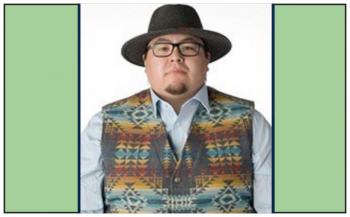Image Caption
Summary
Local Journalism Initiative Reporter
Windspeaker.com
Rob Houle, a member of the Swan River First Nation in Treaty 8 territory, was appointed as the new Indigenous advisor for the Geographical Names Board of Canada (GNBC) on March 1.
Since 1897, the GNBC has been responsible for naming or renaming various landscapes, including mountains, and waterways, including lakes and rivers, across Canada.
Houle is very proud of his new position and believes he will be able to provide strong leadership on the board, just as past generations of his family have provided leadership within his community.
“I’ve always committed,” he said. “My family and my lineage has deep roots in Indigenous leadership. My great grandfather was August Sowan, who was the first chief of Swan River First Nation.”
Houle has been providing his knowledge and leadership through various positions throughout his career, including with the City of Edmonton and the Province of Alberta.
During this time, Houle said he’s seen the inequitable treatment of different communities, and the real lack of understanding about the Indigenous culture and history particularly.
“So I focused on trying to correct that, and trying to spend as much time as I can to changing things for the better,” Houle said.
He believes being a member of the GNBC will allow him to bring the stories of the past to the forefront and reinforce the heritage that belongs to many geographical locations across the country.
“That’s one of my goals through embarking on this work. I think that’s kind of where we have come as a society, is to a place where we can start to reconnect and retell different stories and different understandings,” Houle said.
“That is going to be one of the opportunities with this work, is working directly with communities, working directly with knowledge holders and keepers and helping them breathe life into other names that have existed or names that used to exist.”
Houle said there are currently names, such as Rabbit Hill in Edmonton, which originated from the Cree language, but over time has translated into English and has lost its cultural connection.
“First of all it is finding the stories that are there,” he said, adding the current databases for GNBC does provide some of the historical names, which he wants to further investigate to reconnect the culture to them.
Celebrating its 125 anniversary this year, the Board recognizes the contributions it will make to revitalization and reconciliation of the Indigenous culture by correctly researching and implementing place names.
“The anniversary of the Geographical Names Board of Canada is an opportunity to celebrate 125 years of recording and preserving the history, language, landscape knowledge and cultural heritage of Canada,” said Minister of Natural Resources Jonathan Wilkinson in a press release.
“It is also a time to look back on what has been accomplished and to reflect on our rich history.”
Houle will sit on the board for a two-year term alongside representatives from each province and territory as well as other federal departments.
Currently Houle, a father of three, and his wife are living in Kamloops where he is studying for his law degree at Thompson Rivers University.
Once completed he hopes to hold a position in Indigenous law.
Local Journalism Initiative Reporters are supported by a financial contribution made by the Government of Canada.

